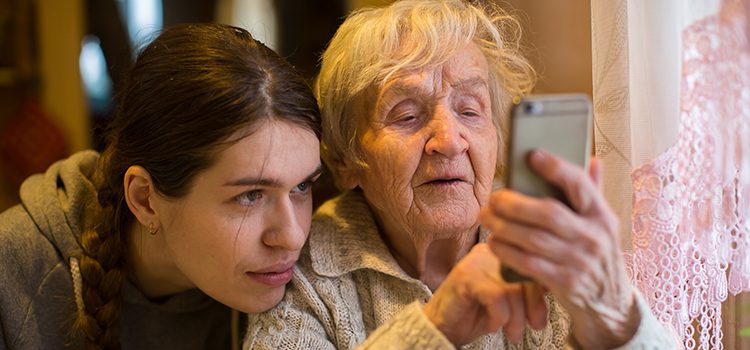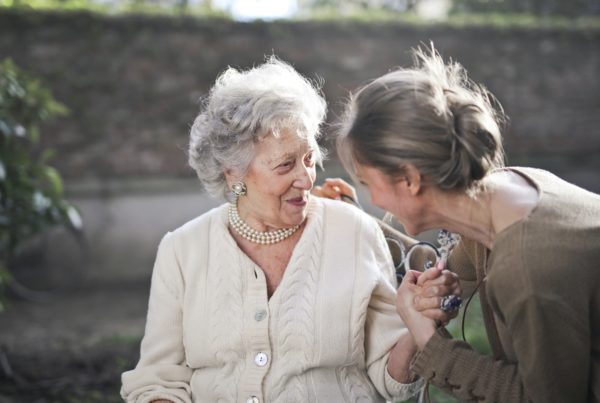13 reasons why older people should use social media to feel connected and less lonely
Loneliness is sadly common in our elderly population, and well over half of people who are over 75 living alone. Many older people in the UK feel out of touch with the pace of modern life, considering the television and pets as their main source of company. And, although they may feel things are going at an increased pace, you can help them get online and using social media with these 13 reasons why older people should use social media.
Loneliness causes feelings of disconnectedness from others, and not belonging. An element of keeping a good overall sense of well-being is to feel like we belong, and if our sense of well-being declines, so does our physical and mental health.
Internet use is increasing with the older generations and they are doing this mainly to keep in touch with family and friends via Facebook; they are becoming more engaged with the internet. They are also using the internet to research and shop, this can be particularly helpful to those with less mobility – reduced mobility can also lead to loneliness.
1. Learning New Things
Learning is a great activity for retaining and improving cognitive health. Keeping the brain active can also delay the progression of Alzheimer’s disease. Your relative will first learn how to use an internet connected device, if they don’t already know this, then they will learn how to use the internet and social media.
They will be able to learn all sorts of new things about the world, and use the internet to find local courses, or new recipes. They might be inspired to start a new hobby, or reignite their passion for a hobby they used to do.
2. Reducing Boredom
If your relative is less mobile and is getting bored of the TV or radio, social media offers all kinds of things in the way of entertainment. From baby goats, inspiring stories and funny cat videos, through to informative documentaries on YouTube, there is something for everybody.
3. Keeping in Touch with Family and Friends
One of the things that is often difficult for families with older relatives, is keeping them up to date with what they are doing. Often an elderly person will receive the odd phone call, however they may find it hard work to hear you if their hearing is not as it used to be. This can result in feelings of frustration and disappointment.
Although it’s good to have a call once in a while, social media opens up a whole world. It offers them the opportunity to keep connected with their families, seeing photos of their grandchildren off to their first day at school, or holiday snaps will be a delightful enjoyment for them.
4. Finding Things to do in Their Community
Facebook is a great place to find things that are happening in the community and nearest towns. It offers notifications of ‘events near you’. Your relative can also find local groups of interest that have events or meetings. This is a great way to meet new people and an excuse get out and about more.
5. Connecting with Like-Minded People
Connecting with like-minded people can fulfil their sense of belonging, reduce loneliness, and often it meets their spiritual needs too.
Finding people that you can enjoy the same interests with can significantly reduce feelings of loneliness and isolation.
Ways to find conversations online can include forums of people discussing subject matters they are interested in, Facebook groups, and sites like Reddit.
6. Getting Support and Information
Social media opens up the doors to a wide variety of supportive groups. A search of Facebook will soon find a group that support each other, this could be mental health, dementia, and most other health conditions.
It can be reassuring to simply read though posts, even if they don’t feel confident to comment and get involved.
7. Feeling More Connected and Involved
Feeling connected to others and continuing with being involved in things contributes to feelings of happiness, and reduces feelings of isolation. Being able to express opinions, chat in groups, or having family photos to see and comment on, will help your older relative to feel connected and included.
8. Keeping Up To Date With The News
The news we receive on the television leaves us with no control over what we would like to hear about. Your relative may have an interest in particular news stories and wish to follow these, or learn more about some wider topics.
With access to the internet and social media they are free to obtain a wider view of the world and current affairs. It broadens the mind, giving your relative things to think about and discuss online should they wish to.
There is also likely to be a Facebook page or group sharing local news.
9. Reminiscing About The Past
We all reminisce about the past and look up things on the internet that we used to see in our day to day lives. Older people will be able to find a rich source of reminiscence materials such as films and music on YouTube.
Social media can be a great place to connect with others to share and enjoy these things with, providing feelings of connection and belonging. Musical reminiscence can be a particularly engaging activity for someone with dementia.
10. Having a Voice in Things That Matter to Them
Maybe your older relative feels strongly about raising awareness for something, be that a health condition, or something political. Social media is a great place to connect with others who feel the same, and allowing your elderly relative to voice their opinions and learn more.
11. Increasing Physical Activity
Finding more local events, or reigniting a hobby can mean that your elderly relative is inspired to get out and about more. This can lead to making new friends, and improving physical health.
12. Gaining Confidence
Socialising, even if it’s digital, means that your relative will retain and improve their confidence. Learning new things, meeting new friends, and being able to have a voice in the things that matter to them, will help your relative feel more confident. It may also encourage them to get out and about more.
13. Reducing Loneliness
Social media helps older people feel more in touch with family and friends and this can ease feelings of loneliness and isolation; they are able to keep up easily with what the grandchildren are doing, or they can meet like-minded people by joining groups.




